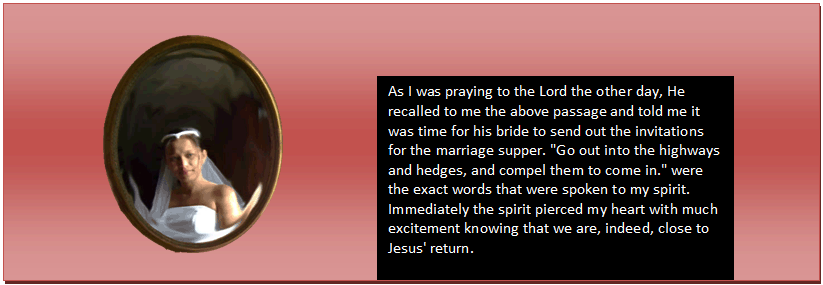
Marriage Supper of the Lamb
Spirit and Bride Say, “Come”
by Joelle Gagnon
As I was praying to the Lord the other day, He recalled to me the above passage and told me it was time for his bride to send out the invitations for the marriage supper. "Go out into the highways and hedges, and compel them to come in." were the exact words that were spoken to my spirit. Immediately the spirit pierced my heart with much excitement knowing that we are, indeed, close to Jesus' return. God has given the Bride the job of sending out invitations (as the spirit leads) while she awaits the bridegroom’s return. She doesn't have to wait for the replies because the R.S.V.P. (Responde sil voit plait - French for respond if you please.) goes to the Father, the master of the house, the initiator of the Marriage Supper invitations.
What an exciting time we are living in. Jesus will be returning soon to catch His bride away. What must his bride do to prepare for his coming? Here is a story I'd like to share about a traditional Jewish wedding taken from the book, An Israeli Love Story by Zola Levitt that illustrates the preparations for the Marriage of the Lamb and His Bride. It is a wonderful foreshadowing of Jesus coming to steal his bride away.
Most Jewish weddings were prearranged and planned so that they fit the needs of the whole society. Sometimes a young man chose his wife, but he had to consult with his father about marrying the woman he chose. When the bridegroom's father approved of the choice (or chose the woman) the young man would go to the bride's house and speak with her father. At the bride's house the young man did three important things in connection with their wedding: 1.) He would make a covenant with the bride - an actual contract; 2.) he would drink a cup of wine with her, which sealed the covenant, and 3.) he would pay a price for her. Her father was entitled to payment for his daughter.
After this was done he would make a speech to the bride because he was going to leave her for a long time and go back to his father's house to build a bridal chamber for her, where they would have their first coming together in marriage. Before he left her he would tell her, "I go to prepare a place for you". The bride didn't worry because she had the contract and the money that was paid for her. He had to build a beautiful bridal chamber and stock it up with provisions for seven days - the prescribed length for the honeymoon. Most importantly, it had to meet his father's approval. If people asked him when he would be getting married he would say, "I don't know, only my father knows".
The bride then waited, and waited with dignity. She would wear her veil whenever she went out, so that no other young man would try to initiate a contract with her. She was called "set apart, consecrated, bought with a price". In effect, she was no longer her own person, but an individual contracted to her bridegroom. She conducted herself with due respect of her agreement with the groom. She never kept company with any other young man, and used her time to think about married life and to prepare herself. She gathered her trousseau (bridal clothes) and waited in her home every night. Traditionally, the groom would come at night, even at midnight and try to take her by surprise. She didn't want to be caught away from home, for she was to be "stolen" out of her house. The bride and bridesmaids, her sisters and whoever was in the wedding party, would be waiting and watching with oil in their lamps in case the groom did choose to come at night.
Suddenly one night the groom would come to steal his bride away. The custom was, when the groom's party was close enough to the home of the bride to be heard, they would shout; and when the bride heard the shout, she knew she was as good as married! The groom's party would grab every girl in sight, especially the one with the veil, and head towards the grooms father's house. When people heard the noise in the streets they would look out their windows. Strangers and people who weren't members of the family wouldn't know who the bride was because of the veil, nor would they be concerned about this particular wedding. The bride and groom would then enter the bridal chamber while the wedding party waited outside until the bridegroom would tell a trusted friend, through the door, that the marriage was consummated. Then the celebration would start. The next time the bride appeared, at the end of the seven days, her veil would be off and she would now be a wife, not a bride. There would then be seven more days of celebration and at the end of those seven days there would be a grand marriage supper. Everyone would congratulate the new couple and it would be a scene of wonderful joy. Finally, the new couple would leave his father's house to take up residence in the husband's house, a place he had prepared for them to live in his own kingdom!
So we can parallel Mr. Levitt's wonderful story of the bride and groom, with the reality of Christ and His bride. This is a living illustration of what will take place when Christ comes to steal His bride away. I pray all who read this will settle for nothing less than being part of the bride of Christ.
''And the: Spirit and the: bride: say, Come. And let him that is athirst come, And whosoever will, let him take the water of life freely" (Rev. 22.17)